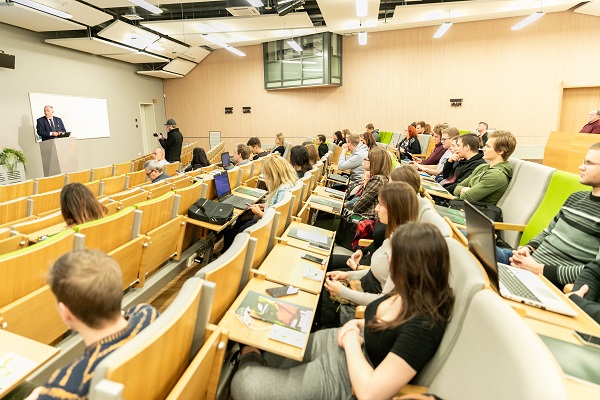The Forest Sector Expects an Increase of the Average Wages to 2000 Euros within the Next Seven Years
By effectively managing and enhancing local natural resources, the forest sector has become one of the strongest pillars of the Latvian economy and a stable export leader with promising future prospects. The industry also offers comprehensive work and career opportunities for emerging specialists of various fields, not only those who study forestry, but also those specialising in architecture, engineering, biology, business and IT. Moreover, during the next seven years, a gradual increase in average wages to 2000 euros is expected. In the conference "Future Perspectives in the Forest Sector" (Nākotnes perspektīvas meža nozarē) organised by JSC "Latvia's State Forests" in cooperation with the University of Latvia, representatives of the forest industry and the academic staff of the University of Latvia shared this opinion. (Photo: Toms Norde)
"The importance of the forest sector in the Latvian economy is characterised by the fact that 52% of the country's territory is covered by forest, while the share of forestry, wood industry and furniture production accounts for 5% of gross domestic product. Consequently, the forest sector exports account for up to 20% of the country's total exports, exceeding the threshold of 2 billion euros. The growth of the sector over the past decade has been based on the development of technologies and production without increasing the volume of resources," says Kristaps Ceplis, Member of the Board of the society "Zaļās mājas".
Uldis Biķis, Chairman of the Supervisory Board of JSC "Latvijas Finieris", shares this opinion pointing out that the forest sector is clearly a leader in growth and cooperation with other sectors. "The forest industry has made very good and pragmatic decisions over the years, which also provided some stability to the industry during the economic crisis. What concerns future, we believe that in the next seven years, we will reach an average salary of 2 000 euros. New opportunities for service and product development are virtually inexhaustible, and team is at the heart of this development. Teamwork is required to ensure a high level of customer service. We offer our customers not only the finished product - birch plywood, but also an added value - awareness about where this product will be used and what else the customer needs to make the product use as successful as possible. But such a high-quality service requires accountants, production staff, as well as logistics and sales experts," says Uldis Biķis.
Kristaps Klauss, Executive Director of the Latvian Forest Industry Federation, shares the vision of JSC "Latvijas Finieris". He emphasises that the companies of the sector shall not stop in their development in order to keep up with the rivals, adding that, for example, JSC "Latvijas Finieris" now is no longer trying to reach Europe, it is working to outpace it even more. At the moment, this company is already ahead of the average plywood producer," says Klauss.
Taking into account the future potential of the forest sector, one of the aims of the conference was to highlight the trends and inform the public, especially students, about the wide range of employment, research and business opportunities provided by the forest sector to a wide range of occupations and fields of science. "The forest sector has evolved in different directions, and it provides future professionals with ever-increasing opportunities. Hence, in-depth academic knowledge of the origins, history and research of forestry is of key importance for starting any activities in the forestry sector," says Valdis Segliņš, Vice-rector of the University of Latvia. "The growing student interest to develop works on the topics offered by JSC "Latvia's State Forests" in cooperation with the company's specialists is already noticeable. Interest in such motivating studies allows students not only to be sure about the usefulness of their research, but also to give their contribution to the development of the national economy."
Arnis Muižnieks, Chairman of the Latvian Forest Owners' Association, agrees with this opinion, pointing out that the human factor has always been significant in the forest and will remain so also in the future. "Forest owners have an important role not only in forest management and in increasing the size of the forest areas, but also in daily interaction between nature and people, striving to achieve a balance between what nature offers and what one can bring to nature. What concerns forest owners, I can say assured that these are people who think about the future, work in a sustainable way and keep up with the today's technologies in the industry. Therefore, I can say that the forest sector is a good perspective for both future employees and entrepreneurs," says Muižnieks.
Dagnis Dubrovskis, Leading Expert of JSC "Latvia's State Forests" presenting the progress of the forest sector, emphasises the following: "The importance of forests in the existence of the human race has not diminished with the change of generations. The fundamental values provided by the forest - heat, material, food, air we breathe are still important. In spite of inflation or other conditions, the value of forest in Latvia has increased significantly over the past hundred years, and it is a result of forestry work. Economic value of forest resources in the national economy of Latvia has been important since ancient times, especially when exporting various forest products. There are also huge opportunities for future growth in the timber industry. Young scientists have an opportunity to explore topics such as new generation fuels, inventory, planning and performance solutions, the development of renewable, environmentally friendly materials and the use of resource-efficient technologies."
The conference "Future Perspectives in the Forest Sector" organised by JSC "Latvia’s State Forests" (LVM) and the University of Latvia took place in the House of Nature of the University of Latvia at 1 Jelgavas Street, Riga on 22 November. Representatives of both the public and the private sector shared their expertise and professional opinions in fields such as forestry, woodworking, bio-economy, etc. They analysed the origins of forestry, as well as today’s practices, forest resources and value, discussed the forestry strategy and future employment opportunities.























